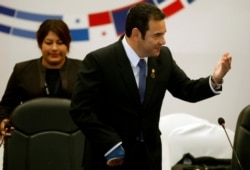Guatemala's Constitutional Court has blocked President Jimmy Morales from immediately declaring the poor Central American nation a safe third country for asylum-seekers, amid growing pushback to U.S. pressure that it absorb large numbers of migrants.
The provisional decision came late Sunday, hours after the Guatemalan government said it had postponed a planned summit with President Donald Trump in Washington to await the court's ruling. Morales had been widely expected to sign a safe third country agreement at the summit.
The United States wants Guatemala, Mexico and other countries in the region to act as buffer zones, taking in asylum-seekers who would otherwise apply in the United States. Such proposals, similar to an arrangement by which Turkey takes in mainly Syrian refugees to lessen flows to the European Union, have been widely criticized as endangering vulnerable migrants.
Guatemala, one of the poorest nations in the Western Hemisphere, has high rates of violence and a weak rule of law.
Tens of thousands of its own citizens have sought refuge in the United States this year.
Ramping up the pressure, the U.S. government on Monday unilaterally declared that all asylum-seekers reaching the U.S. southern border must first request refuge elsewhere. The policy appeared to be another attempt at making Mexico and Guatemala take in most asylum-seekers that currently apply in the United States, with or without those countries' consent.
'Saved from a catastrophe'
Guatemala's Constitutional Court ruling came after the government's human rights ombudsman and four former Guatemalan foreign ministers sought legal stays to stop Morales signing a safe third country deal, describing the designation as a "very grave" move that would be harmful to Guatemala's inhabitants.
"It seemed to me a categorical decision," said Edgar Gutierrez, a former foreign minister who co-signed the appeal. "We are saved from a catastrophe."
The Guatemalan government did not immediately respond to the ruling and it was not clear what steps it would take next.
Four out of five Constitutional Court magistrates ruled in favor of the stay after deliberating for 2-1/2 hours, said Constitutional Court secretary Martin Guzman in a press conference late Sunday.
"The Constitutional Court ordered the provisional relief requested by the petitioners," Guzman said, explaining that the decision hinged on a constitutional provision that prevents the president from making such decisions "without approval and knowledge" of the Congress.






